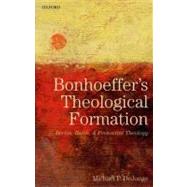Bonhoeffer's Theological Formation Berlin, Barth, and Protestant Theology
, by DeJonge, Michael P.- ISBN: 9780199639786 | 0199639787
- Cover: Hardcover
- Copyright: 5/16/2012
Dietrich Bonhoeffer's dramatic biography, a son of privilege who suffered imprisonment and execution after involving himself in a conspiracy to kill Hitler and overthrow the Third Reich, has helped make him one of the most influential Christian figures of the twentieth century. But before he was known as a martyr or a hero, he was a student and teacher of theology. This book examines the academic formation of Dietrich Bonhoeffer's theology, arguing that the young Bonhoeffer reinterpreted for a modern intellectual context the Lutheran understanding of the 'person' of Jesus Christ. In the process, Bonhoeffer not only distinguished himself from both Karl Barth and Karl Holl, whose dialectical theology and Luther interpretation respectively were two of the most important post-World War I theological movements, but also established the basic character of his own 'person-theology.' Barth convinces Bonhoeffer that theology must understand revelation as originating outside the human self in God's freedom. But whereas Barth understands revelation as the act of an eternal divine subject, Bonhoeffer treats revelation as the act and being of the historical person of Jesus Christ. On the basis of this person-concept of revelation, Bonhoeffer rejects Barth's dialectical thought, designed to respect the distinction between God and world, for a hermeneutical way of thinking that begins with the reconciliation of God and world in the person of Christ. Here Bonhoeffer mines a Lutheran understanding of the incarnation as God's unreserved entry into history, and the person of Christ as the resulting historical reconciliation of opposites. This also distinguishes Bonhoeffer's Lutheranism from that of Karl Holl, one of Bonhoeffer's teachers in Berlin, whose location of justification in the conscience renders the presence of Christ superfluous. Against this, Bonhoeffer emphasizes the present person of Christ as the precondition of justification. Through these critical conversations, Bonhoeffer develops the features of his person-theology --- a person-concept of revelation and a hermeneutical way of thinking --- which remain constant despite the sometimes radical changes in his thought.







